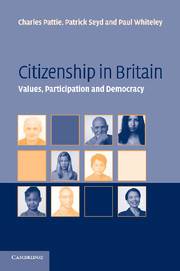Book contents
5 - Alternative Theories of Citizenship
Published online by Cambridge University Press: 22 September 2009
Summary
In earlier chapters we have examined the attitudinal and behavioural foundations of citizenship in Britain. As we have seen, there is a lot of voluntary activity, both formal and informal, which underpins citizenship and a broad set of attitudes and values which support the democratic system. In common usage, the term ‘citizenship’ is a very broad concept and it encompasses questions of identity, ethnicity, gender, participation, attitudes and values as well as perceptions of rights and obligations. Unfortunately, such a broad concept is not very useful for purposes of empirical analysis, since it encompasses too many issues. In chapter 1 we suggested that citizenship is at root a set of norms, values and practices which evolve so that individuals can solve collective action problems. Accordingly, we focus on just two key dimensions which are linked to this idea, one being attitudinal and the other behavioural. The attitudinal dimension relates to the balance between the individual's sense of their rights and their obligations to the wider society. The behavioural dimension relates to whether or not they participate in a way which supports civil society and democratic politics.
The key task of this chapter is to provide alternative theoretical accounts of the determinants of citizenship in the sense defined earlier. We shall consider different theoretical explanations of why people vary both in their civic attitudes and in their behaviour. The starting point of the analysis, however, is to clarify how the concept of citizenship should be measured.
- Type
- Chapter
- Information
- Citizenship in BritainValues, Participation and Democracy, pp. 129 - 151Publisher: Cambridge University PressPrint publication year: 2004



